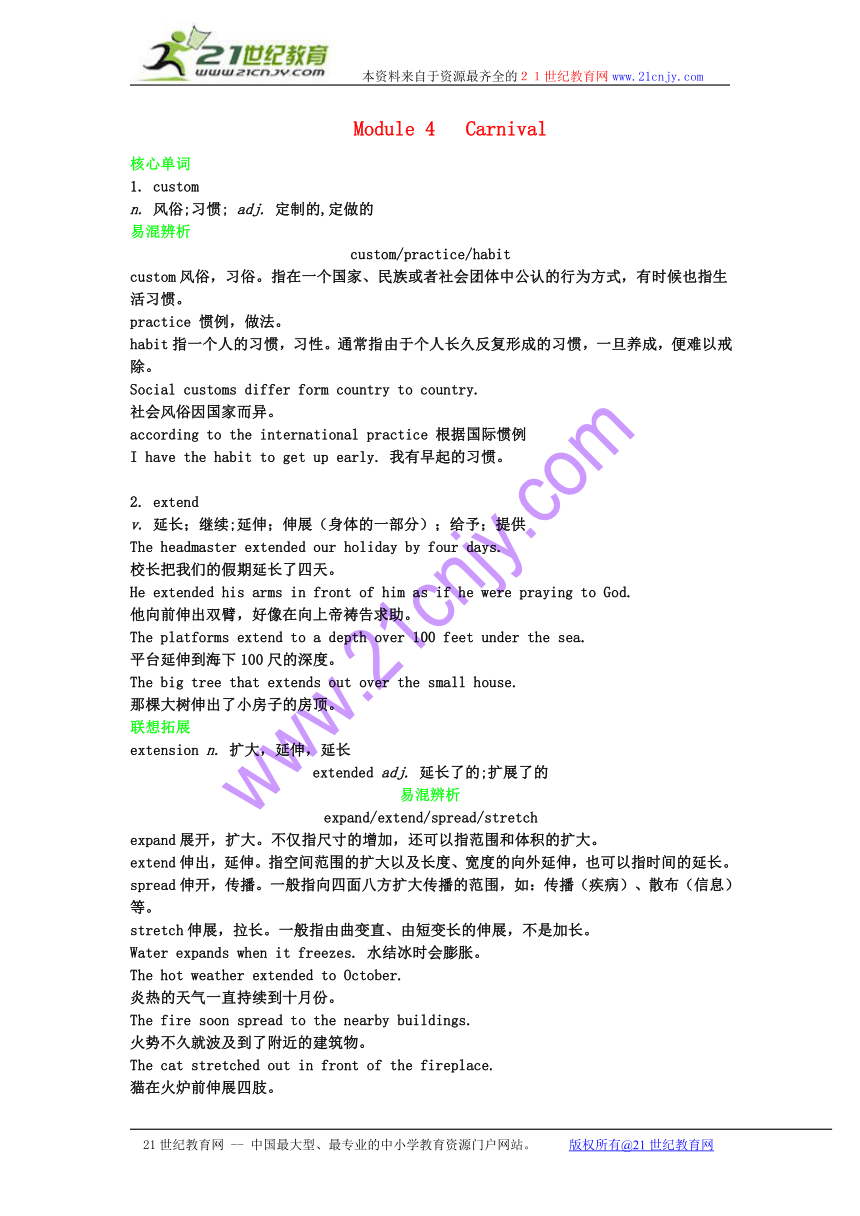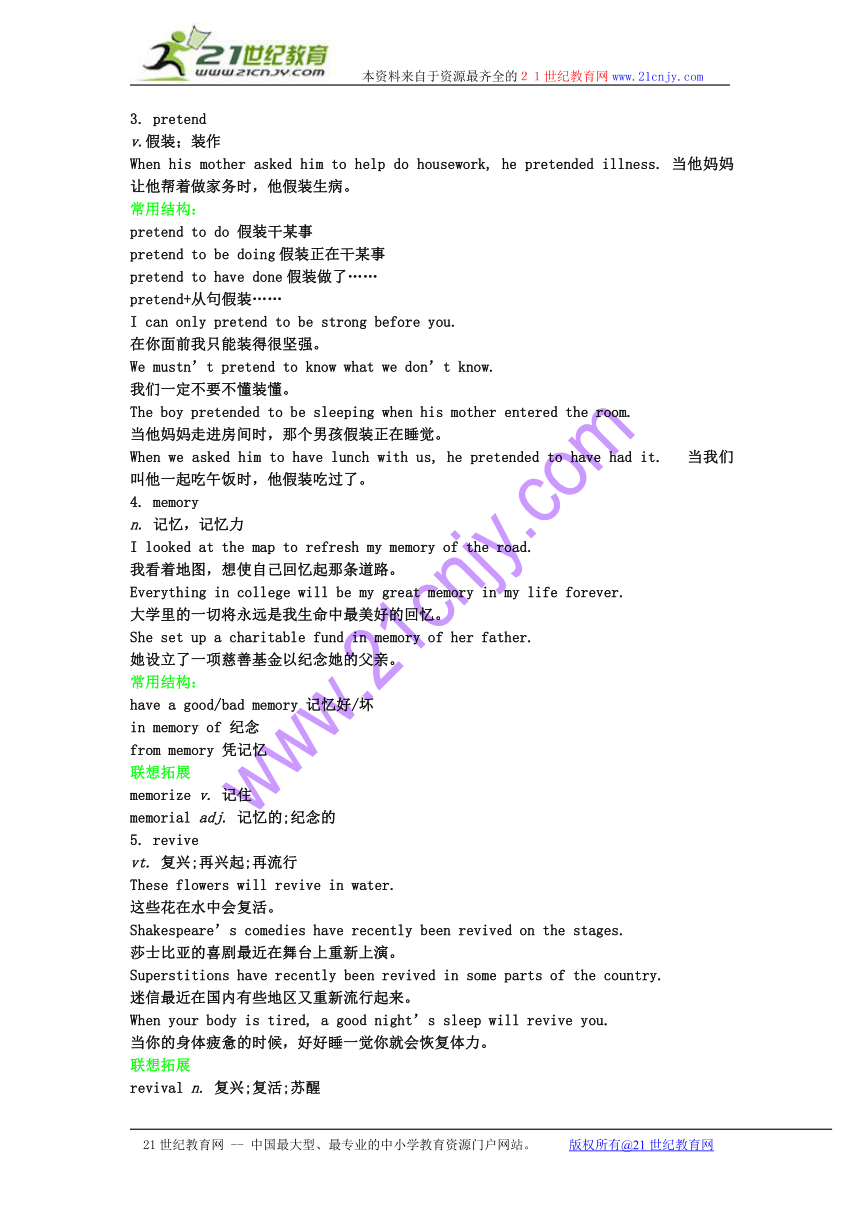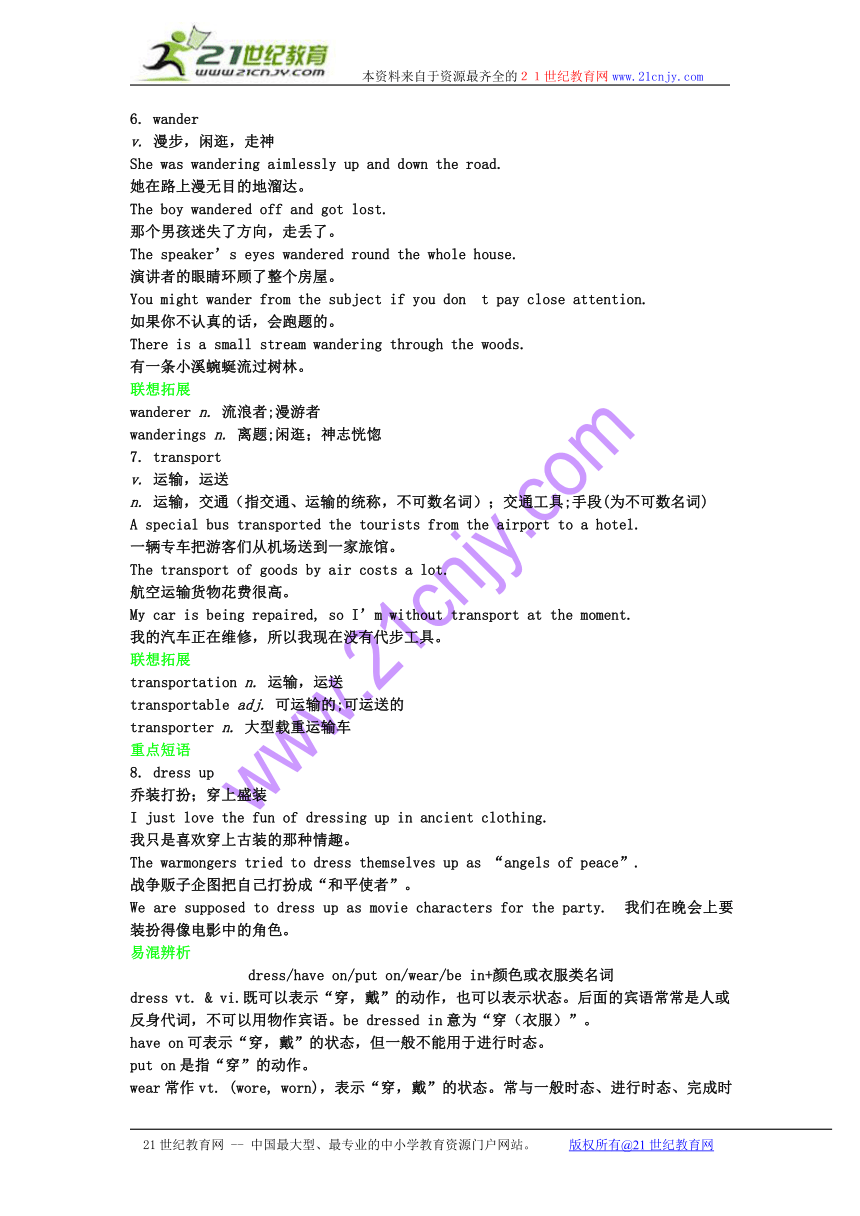2011高三英语第一轮总复习 module 4 carnival学案
文档属性
| 名称 | 2011高三英语第一轮总复习 module 4 carnival学案 |

|
|
| 格式 | rar | ||
| 文件大小 | 18.9KB | ||
| 资源类型 | 教案 | ||
| 版本资源 | 外研版 | ||
| 科目 | 英语 | ||
| 更新时间 | 2010-12-26 00:00:00 | ||
图片预览



文档简介
本资料来自于资源最齐全的21世纪教育网www.21cnjy.com
Module 4 Carnival
核心单词
1. custom
n. 风俗;习惯; adj. 定制的,定做的
易混辨析
custom/practice/habit
custom风俗,习俗。指在一个国家、民族或者社会团体中公认的行为方式,有时候也指生活习惯。
practice 惯例,做法。
habit指一个人的习惯,习性。通常指由于个人长久反复形成的习惯,一旦养成,便难以戒除。
Social customs differ form country to country.
社会风俗因国家而异。
according to the international practice 根据国际惯例
I have the habit to get up early. 我有早起的习惯。
2. extend
v. 延长;继续;延伸;伸展(身体的一部分);给予;提供
The headmaster extended our holiday by four days.
校长把我们的假期延长了四天。
He extended his arms in front of him as if he were praying to God.
他向前伸出双臂,好像在向上帝祷告求助。
The platforms extend to a depth over 100 feet under the sea.
平台延伸到海下100尺的深度。
The big tree that extends out over the small house.
那棵大树伸出了小房子的房顶。
联想拓展
extension n. 扩大,延伸,延长
extended adj. 延长了的;扩展了的
易混辨析
expand/extend/spread/stretch
expand展开,扩大。不仅指尺寸的增加,还可以指范围和体积的扩大。
extend伸出,延伸。指空间范围的扩大以及长度、宽度的向外延伸,也可以指时间的延长。
spread伸开,传播。一般指向四面八方扩大传播的范围,如:传播(疾病)、散布(信息)等。
stretch伸展,拉长。一般指由曲变直、由短变长的伸展,不是加长。
Water expands when it freezes. 水结冰时会膨胀。
The hot weather extended to October.
炎热的天气一直持续到十月份。
The fire soon spread to the nearby buildings.
火势不久就波及到了附近的建筑物。
The cat stretched out in front of the fireplace.
猫在火炉前伸展四肢。
3. pretend
v.假装;装作
When his mother asked him to help do housework, he pretended illness. 当他妈妈让他帮着做家务时,他假装生病。
常用结构:
pretend to do 假装干某事
pretend to be doing假装正在干某事
pretend to have done假装做了……
pretend+从句假装……
I can only pretend to be strong before you.
在你面前我只能装得很坚强。
We mustn’t pretend to know what we don’t know.
我们一定不要不懂装懂。
The boy pretended to be sleeping when his mother entered the room.
当他妈妈走进房间时,那个男孩假装正在睡觉。
When we asked him to have lunch with us, he pretended to have had it. 当我们叫他一起吃午饭时,他假装吃过了。
4. memory
n. 记忆,记忆力
I looked at the map to refresh my memory of the road.
我看着地图,想使自己回忆起那条道路。
Everything in college will be my great memory in my life forever.
大学里的一切将永远是我生命中最美好的回忆。
She set up a charitable fund in memory of her father.
她设立了一项慈善基金以纪念她的父亲。
常用结构:
have a good/bad memory 记忆好/坏
in memory of 纪念
from memory 凭记忆
联想拓展
memorize v. 记住
memorial adj. 记忆的;纪念的
5. revive
vt. 复兴;再兴起;再流行
These flowers will revive in water.
这些花在水中会复活。
Shakespeare’s comedies have recently been revived on the stages.
莎士比亚的喜剧最近在舞台上重新上演。
Superstitions have recently been revived in some parts of the country.
迷信最近在国内有些地区又重新流行起来。
When your body is tired, a good night’s sleep will revive you.
当你的身体疲惫的时候,好好睡一觉你就会恢复体力。
联想拓展
revival n. 复兴;复活;苏醒
6. wander
v. 漫步,闲逛,走神
She was wandering aimlessly up and down the road.
她在路上漫无目的地溜达。
The boy wandered off and got lost.
那个男孩迷失了方向,走丢了。
The speaker’s eyes wandered round the whole house.
演讲者的眼睛环顾了整个房屋。
You might wander from the subject if you don?t pay close attention.
如果你不认真的话,会跑题的。
There is a small stream wandering through the woods.
有一条小溪蜿蜒流过树林。
联想拓展
wanderer n. 流浪者;漫游者
wanderings n. 离题;闲逛;神志恍惚
7. transport
v. 运输,运送
n. 运输,交通(指交通、运输的统称,不可数名词);交通工具;手段(为不可数名词)
A special bus transported the tourists from the airport to a hotel.
一辆专车把游客们从机场送到一家旅馆。
The transport of goods by air costs a lot.
航空运输货物花费很高。
My car is being repaired, so I’m without transport at the moment.
我的汽车正在维修,所以我现在没有代步工具。
联想拓展
transportation n. 运输,运送
transportable adj. 可运输的;可运送的
transporter n. 大型载重运输车
重点短语
8. dress up
乔装打扮;穿上盛装
I just love the fun of dressing up in ancient clothing.
我只是喜欢穿上古装的那种情趣。
The warmongers tried to dress themselves up as “angels of peace”.
战争贩子企图把自己打扮成“和平使者”。
We are supposed to dress up as movie characters for the party. 我们在晚会上要装扮得像电影中的角色。
易混辨析
dress/have on/put on/wear/be in+颜色或衣服类名词
dress vt. & vi.既可以表示“穿,戴”的动作,也可以表示状态。后面的宾语常常是人或反身代词,不可以用物作宾语。be dressed in意为“穿(衣服)”。
have on可表示“穿,戴”的状态,但一般不能用于进行时态。
put on是指“穿”的动作。
wear常作vt. (wore, worn),表示“穿,戴”的状态。常与一般时态、进行时态、完成时态连用,表示状态或结果。还可以指戴手表、首饰、胸章或留长发、胡子等,常接的宾语有clothes, skirt, hat, shoes, watch, glasses, ring, flower, necklace等。
be in+颜色或衣服类名词,意为“穿着”,表示状态。在句中作表语或定语。
Mother is dressing her child now.
妈妈正在给她的孩子穿衣服。
He is dressed in a red sweater today.
他今天穿着一件红色的毛衣。
The emperor had nothing on in the middle of the procession. 皇帝什么也没穿,走在游行队伍中间。
On New Year’s Day the children had on their new clothes.
孩子们在新年那一天都穿着新衣服。
Put on more clothes.多穿点衣服。
He is wearing a red hat. 他正戴着一顶红色的帽子。
Is the girl in the hat?是戴着帽子的那个姑娘吗?
9. see ...as ...
把……看作……
America is seen as the land of opportunity.
美国被看成是机会的土壤。
Wawu Mountain of Sichuan is seen as the Baimuda Triangle of China.
四川的瓦屋山被看作是中国的百慕大三角洲。
联想拓展
表示“把……看作,视为”的短语还有:
treat ...as ...; regard ...as ...; think of ...as ...; consider ...as ...; look on ...as ...etc.
We all think of the plan as a perfect one.
我们都认为这是一个完美的计划。
The parents look on their children as the best ones.
父母都认为自己的孩子是最棒的。
e to an end
结束;完结
Don’t cry because it come to an end, smile because it happened.
要学会微笑面对事情的发生,而不是为事情的结束而哭泣。
The project came to an end last month.
这项工程上个月就结束了。
After two hours the meeting came to an end.
两个小时过去了,会议终于结束了。
联想拓展
end to end 首尾相连地;头对头地
in the end 最后;终于
at the end of 在……的尽头;末尾
from beginning to end 从一端到另一端;自始至终
bring ...to an end 结束;终止
put an end to sth. 结束;停止某事
make ends meet 量入为出,使收支相抵
易混辨析
come to an end/put an end to
come to an end结束;完结,相当于不及物动词,所以不能用于被动语态,主语一般是物。
put an end to sth.结束某物,相当于及物动词,可以用于被动语态,主语一般是表示人或者某一组织的名词。
11. consist of
由……组成;由……构成,与be made up of和be composed of同义,不可用于进行时,也没有被动语态。
Our team consists of 15 members.
=Our team is made up of 15 members.
我们队由15位成员组成。
Most people are familiar with the idea that all matter consist of atoms. 大多数人熟悉一切物质都是由原子组成的这一概念。
联想拓展
consist in 在于;存在于
consist with 与……一致
12. think of
对……有某种看法,常与副词或副词短语连用。
联想拓展
think well/ill of认为……好/不好
think much/little of认为……不错/轻视
think highly/lightly of看重/轻……;对……评价很高/轻视
speak highly of 对……评价很好
speak ill of说……的坏话;对……评价不高
sing high praise for高度赞扬
have a good/high opinion of sb./sth.
对某人/某事评价很高
have no opinion of sb./sth. 对某人/某事评价不高
I think ill of his behaviour.
我认为他的行为不好。
I don’t think much of that new restaurant.
我对那家新饭馆评价不高。
He thought highly of my work. 他对我的工作评价很高。
13. take over
接管,取而代之;承袭;沿袭,后可以接介词from。
Try not to let the negative thoughts take over.
尽量不要让消极的思想左右(我们)。
Johnson took over the chairmanship of the committee yesterday. 约翰逊昨天接任委员会主席一职。
Romans took over from the Greeks not only their philosophy but their arts.
罗马人不仅承袭了希腊人的哲学而且还承袭了他们的艺术。
When Mr Green retired, his son took over the business from him. 格林先生退休后,由他的儿子接管他的生意。
联想拓展
take on 呈现 take up 拿起;从事
take in 吸收;理解;欺骗 take off 起飞;脱下
take away 拿走;带走 take down 记下;拿下
take out 取出;去掉
重点句型
14. The arrival of Europeans in America, and the opening of huge farms and plantations to grow cotton, fruit and vegetables, meant there was an immediate need for people to work on them.
欧洲人到了美洲,开辟了栽种棉花、水果和蔬菜的大农场与大种植园,这意味着急需干活的人手。
The arrival of ...and the opening of ...vegetables为整个句子的主语,meant为谓语;there was ...on them是宾语从句作宾语。
联想拓展
There was ...need for sb. to do sth. 需要某人干某事
There is/was ...need for sb./sth. 需要某人/某事
There is/was no need to do sth. 没有必要做某事
There is/was no time to do sth. 没有时间做某事
There is/was no doubt to do sth. 毫无疑问做某事
It’s/It was no wonder that ...难怪,怪不得……
There is no need for primary students to work at their desks all day long.小学生没有必要整天在桌前学习.
Ⅰ.利用构词法,品句填词
What _______ me most is the _______story book, but Tom is not in the places of _______. (interest)
答案:interests; interesting; interested; interest
动词 动词+ing 动词+ed 名词
interest 使……感兴趣 interesting 使人感到高兴的 interested 感到高兴的 __1__兴趣,爱好
excite 激动 exciting 令人激动的 excited 感到激动的 __2__令人兴奋的事物
disappoint 使失望 disappointing 令人失望的 disappointed 感到失望的 __3__失望
please 使高兴 pleasing 令人愉快的 pleased 感到愉快的 __4__快乐;娱乐
surprise 使惊奇 surprising 令人惊异的 surprised 感到惊异的 __5__惊奇,诧异
satisfy 令人满意 satisfying 令人满意的 satisfied 感到满意的 __6__满足,满意
worry 折磨;发愁 worrying 令人担心的 worried 感到担心的 __7__烦恼;担心
confuse 使困惑 confusing 令人困惑的 confused 感到困惑的 __8__混淆;困惑
embarrass 使困窘 embarrassing 令人尴尬的 embarrassed 感到尴尬的 __9__窘迫,难堪
encourage 鼓励,怂恿 encouraging 令人鼓舞的 encouraged 感到鼓舞的 __10__鼓励
Ⅱ. 串联扩展
在横线上填入适当的单词
答案:
1.Interest
2.excitement
3.disappointment
4.pleasure
5.Surprise
6.satisfaction
7.worry
8.confusion
9.Embarrassment
10.encouragement
21世纪教育网 -- 中国最大型、最专业的中小学教育资源门户网站。 版权所有@21世纪教育网
Module 4 Carnival
核心单词
1. custom
n. 风俗;习惯; adj. 定制的,定做的
易混辨析
custom/practice/habit
custom风俗,习俗。指在一个国家、民族或者社会团体中公认的行为方式,有时候也指生活习惯。
practice 惯例,做法。
habit指一个人的习惯,习性。通常指由于个人长久反复形成的习惯,一旦养成,便难以戒除。
Social customs differ form country to country.
社会风俗因国家而异。
according to the international practice 根据国际惯例
I have the habit to get up early. 我有早起的习惯。
2. extend
v. 延长;继续;延伸;伸展(身体的一部分);给予;提供
The headmaster extended our holiday by four days.
校长把我们的假期延长了四天。
He extended his arms in front of him as if he were praying to God.
他向前伸出双臂,好像在向上帝祷告求助。
The platforms extend to a depth over 100 feet under the sea.
平台延伸到海下100尺的深度。
The big tree that extends out over the small house.
那棵大树伸出了小房子的房顶。
联想拓展
extension n. 扩大,延伸,延长
extended adj. 延长了的;扩展了的
易混辨析
expand/extend/spread/stretch
expand展开,扩大。不仅指尺寸的增加,还可以指范围和体积的扩大。
extend伸出,延伸。指空间范围的扩大以及长度、宽度的向外延伸,也可以指时间的延长。
spread伸开,传播。一般指向四面八方扩大传播的范围,如:传播(疾病)、散布(信息)等。
stretch伸展,拉长。一般指由曲变直、由短变长的伸展,不是加长。
Water expands when it freezes. 水结冰时会膨胀。
The hot weather extended to October.
炎热的天气一直持续到十月份。
The fire soon spread to the nearby buildings.
火势不久就波及到了附近的建筑物。
The cat stretched out in front of the fireplace.
猫在火炉前伸展四肢。
3. pretend
v.假装;装作
When his mother asked him to help do housework, he pretended illness. 当他妈妈让他帮着做家务时,他假装生病。
常用结构:
pretend to do 假装干某事
pretend to be doing假装正在干某事
pretend to have done假装做了……
pretend+从句假装……
I can only pretend to be strong before you.
在你面前我只能装得很坚强。
We mustn’t pretend to know what we don’t know.
我们一定不要不懂装懂。
The boy pretended to be sleeping when his mother entered the room.
当他妈妈走进房间时,那个男孩假装正在睡觉。
When we asked him to have lunch with us, he pretended to have had it. 当我们叫他一起吃午饭时,他假装吃过了。
4. memory
n. 记忆,记忆力
I looked at the map to refresh my memory of the road.
我看着地图,想使自己回忆起那条道路。
Everything in college will be my great memory in my life forever.
大学里的一切将永远是我生命中最美好的回忆。
She set up a charitable fund in memory of her father.
她设立了一项慈善基金以纪念她的父亲。
常用结构:
have a good/bad memory 记忆好/坏
in memory of 纪念
from memory 凭记忆
联想拓展
memorize v. 记住
memorial adj. 记忆的;纪念的
5. revive
vt. 复兴;再兴起;再流行
These flowers will revive in water.
这些花在水中会复活。
Shakespeare’s comedies have recently been revived on the stages.
莎士比亚的喜剧最近在舞台上重新上演。
Superstitions have recently been revived in some parts of the country.
迷信最近在国内有些地区又重新流行起来。
When your body is tired, a good night’s sleep will revive you.
当你的身体疲惫的时候,好好睡一觉你就会恢复体力。
联想拓展
revival n. 复兴;复活;苏醒
6. wander
v. 漫步,闲逛,走神
She was wandering aimlessly up and down the road.
她在路上漫无目的地溜达。
The boy wandered off and got lost.
那个男孩迷失了方向,走丢了。
The speaker’s eyes wandered round the whole house.
演讲者的眼睛环顾了整个房屋。
You might wander from the subject if you don?t pay close attention.
如果你不认真的话,会跑题的。
There is a small stream wandering through the woods.
有一条小溪蜿蜒流过树林。
联想拓展
wanderer n. 流浪者;漫游者
wanderings n. 离题;闲逛;神志恍惚
7. transport
v. 运输,运送
n. 运输,交通(指交通、运输的统称,不可数名词);交通工具;手段(为不可数名词)
A special bus transported the tourists from the airport to a hotel.
一辆专车把游客们从机场送到一家旅馆。
The transport of goods by air costs a lot.
航空运输货物花费很高。
My car is being repaired, so I’m without transport at the moment.
我的汽车正在维修,所以我现在没有代步工具。
联想拓展
transportation n. 运输,运送
transportable adj. 可运输的;可运送的
transporter n. 大型载重运输车
重点短语
8. dress up
乔装打扮;穿上盛装
I just love the fun of dressing up in ancient clothing.
我只是喜欢穿上古装的那种情趣。
The warmongers tried to dress themselves up as “angels of peace”.
战争贩子企图把自己打扮成“和平使者”。
We are supposed to dress up as movie characters for the party. 我们在晚会上要装扮得像电影中的角色。
易混辨析
dress/have on/put on/wear/be in+颜色或衣服类名词
dress vt. & vi.既可以表示“穿,戴”的动作,也可以表示状态。后面的宾语常常是人或反身代词,不可以用物作宾语。be dressed in意为“穿(衣服)”。
have on可表示“穿,戴”的状态,但一般不能用于进行时态。
put on是指“穿”的动作。
wear常作vt. (wore, worn),表示“穿,戴”的状态。常与一般时态、进行时态、完成时态连用,表示状态或结果。还可以指戴手表、首饰、胸章或留长发、胡子等,常接的宾语有clothes, skirt, hat, shoes, watch, glasses, ring, flower, necklace等。
be in+颜色或衣服类名词,意为“穿着”,表示状态。在句中作表语或定语。
Mother is dressing her child now.
妈妈正在给她的孩子穿衣服。
He is dressed in a red sweater today.
他今天穿着一件红色的毛衣。
The emperor had nothing on in the middle of the procession. 皇帝什么也没穿,走在游行队伍中间。
On New Year’s Day the children had on their new clothes.
孩子们在新年那一天都穿着新衣服。
Put on more clothes.多穿点衣服。
He is wearing a red hat. 他正戴着一顶红色的帽子。
Is the girl in the hat?是戴着帽子的那个姑娘吗?
9. see ...as ...
把……看作……
America is seen as the land of opportunity.
美国被看成是机会的土壤。
Wawu Mountain of Sichuan is seen as the Baimuda Triangle of China.
四川的瓦屋山被看作是中国的百慕大三角洲。
联想拓展
表示“把……看作,视为”的短语还有:
treat ...as ...; regard ...as ...; think of ...as ...; consider ...as ...; look on ...as ...etc.
We all think of the plan as a perfect one.
我们都认为这是一个完美的计划。
The parents look on their children as the best ones.
父母都认为自己的孩子是最棒的。
e to an end
结束;完结
Don’t cry because it come to an end, smile because it happened.
要学会微笑面对事情的发生,而不是为事情的结束而哭泣。
The project came to an end last month.
这项工程上个月就结束了。
After two hours the meeting came to an end.
两个小时过去了,会议终于结束了。
联想拓展
end to end 首尾相连地;头对头地
in the end 最后;终于
at the end of 在……的尽头;末尾
from beginning to end 从一端到另一端;自始至终
bring ...to an end 结束;终止
put an end to sth. 结束;停止某事
make ends meet 量入为出,使收支相抵
易混辨析
come to an end/put an end to
come to an end结束;完结,相当于不及物动词,所以不能用于被动语态,主语一般是物。
put an end to sth.结束某物,相当于及物动词,可以用于被动语态,主语一般是表示人或者某一组织的名词。
11. consist of
由……组成;由……构成,与be made up of和be composed of同义,不可用于进行时,也没有被动语态。
Our team consists of 15 members.
=Our team is made up of 15 members.
我们队由15位成员组成。
Most people are familiar with the idea that all matter consist of atoms. 大多数人熟悉一切物质都是由原子组成的这一概念。
联想拓展
consist in 在于;存在于
consist with 与……一致
12. think of
对……有某种看法,常与副词或副词短语连用。
联想拓展
think well/ill of认为……好/不好
think much/little of认为……不错/轻视
think highly/lightly of看重/轻……;对……评价很高/轻视
speak highly of 对……评价很好
speak ill of说……的坏话;对……评价不高
sing high praise for高度赞扬
have a good/high opinion of sb./sth.
对某人/某事评价很高
have no opinion of sb./sth. 对某人/某事评价不高
I think ill of his behaviour.
我认为他的行为不好。
I don’t think much of that new restaurant.
我对那家新饭馆评价不高。
He thought highly of my work. 他对我的工作评价很高。
13. take over
接管,取而代之;承袭;沿袭,后可以接介词from。
Try not to let the negative thoughts take over.
尽量不要让消极的思想左右(我们)。
Johnson took over the chairmanship of the committee yesterday. 约翰逊昨天接任委员会主席一职。
Romans took over from the Greeks not only their philosophy but their arts.
罗马人不仅承袭了希腊人的哲学而且还承袭了他们的艺术。
When Mr Green retired, his son took over the business from him. 格林先生退休后,由他的儿子接管他的生意。
联想拓展
take on 呈现 take up 拿起;从事
take in 吸收;理解;欺骗 take off 起飞;脱下
take away 拿走;带走 take down 记下;拿下
take out 取出;去掉
重点句型
14. The arrival of Europeans in America, and the opening of huge farms and plantations to grow cotton, fruit and vegetables, meant there was an immediate need for people to work on them.
欧洲人到了美洲,开辟了栽种棉花、水果和蔬菜的大农场与大种植园,这意味着急需干活的人手。
The arrival of ...and the opening of ...vegetables为整个句子的主语,meant为谓语;there was ...on them是宾语从句作宾语。
联想拓展
There was ...need for sb. to do sth. 需要某人干某事
There is/was ...need for sb./sth. 需要某人/某事
There is/was no need to do sth. 没有必要做某事
There is/was no time to do sth. 没有时间做某事
There is/was no doubt to do sth. 毫无疑问做某事
It’s/It was no wonder that ...难怪,怪不得……
There is no need for primary students to work at their desks all day long.小学生没有必要整天在桌前学习.
Ⅰ.利用构词法,品句填词
What _______ me most is the _______story book, but Tom is not in the places of _______. (interest)
答案:interests; interesting; interested; interest
动词 动词+ing 动词+ed 名词
interest 使……感兴趣 interesting 使人感到高兴的 interested 感到高兴的 __1__兴趣,爱好
excite 激动 exciting 令人激动的 excited 感到激动的 __2__令人兴奋的事物
disappoint 使失望 disappointing 令人失望的 disappointed 感到失望的 __3__失望
please 使高兴 pleasing 令人愉快的 pleased 感到愉快的 __4__快乐;娱乐
surprise 使惊奇 surprising 令人惊异的 surprised 感到惊异的 __5__惊奇,诧异
satisfy 令人满意 satisfying 令人满意的 satisfied 感到满意的 __6__满足,满意
worry 折磨;发愁 worrying 令人担心的 worried 感到担心的 __7__烦恼;担心
confuse 使困惑 confusing 令人困惑的 confused 感到困惑的 __8__混淆;困惑
embarrass 使困窘 embarrassing 令人尴尬的 embarrassed 感到尴尬的 __9__窘迫,难堪
encourage 鼓励,怂恿 encouraging 令人鼓舞的 encouraged 感到鼓舞的 __10__鼓励
Ⅱ. 串联扩展
在横线上填入适当的单词
答案:
1.Interest
2.excitement
3.disappointment
4.pleasure
5.Surprise
6.satisfaction
7.worry
8.confusion
9.Embarrassment
10.encouragement
21世纪教育网 -- 中国最大型、最专业的中小学教育资源门户网站。 版权所有@21世纪教育网
